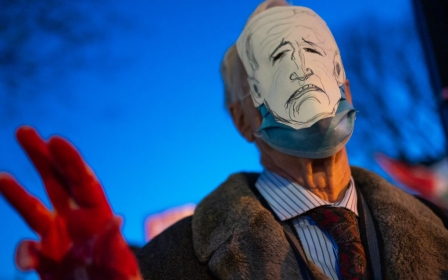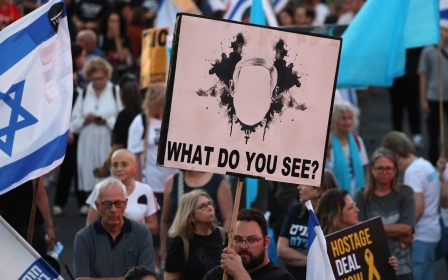Why the ceasefire proposal Biden announced for Gaza has stalled

(Bashar Taleb/AFP)
US President Joe Biden unveiled a detailed plan to end the war in Gaza from the White House last week, but four days later, neither Israel nor Hamas have signed the plan.
The delay on Israel’s side is all the more awkward for the US because the Biden administration has cast the proposal as an Israeli proposal.
In the first of three phases, Biden laid out there would be a six-week ceasefire in Gaza and the withdrawal of all Israeli forces from all population centres.
During the first phase, Hamas would exchange hostages including women, the elderly, and the wounded for hundreds of Palestinian prisoners. US citizens would also be released, as well as the remains of dead hostages, and Palestinians would also be able to return to “all areas of Gaza”.
The second phase would include an exchange of all remaining living hostages, including male soldiers, and the withdrawal of Israeli forces from Gaza. Israel and Hamas would discuss a permanent ceasefire. As long as negotiations continue, the temporary ceasefire would hold. The third phase involves the reconstruction and postwar governance of Gaza.
New MEE newsletter: Jerusalem Dispatch
Sign up to get the latest insights and analysis on Israel-Palestine, alongside Turkey Unpacked and other MEE newsletters
The plan appears nearly identical to the CIA-mediated one Hamas said it was offered in early May. Israel rejected the plan by launching an invasion of Rafah.
While US officials have been adamant that the newest proposal is from Israel, the Israelis have not roundly endorsed it.
Israeli or US proposal?
“I know of no gaps to speak of,” White House spokesperson John Kirby said on Monday, when asked whether the plan the US announced was the same one that Israel has proposed to Hamas.
“We’re confident that [Biden’s description] accurately reflects that [Israeli] proposal - a proposal that we worked with the Israelis on,” Kirby said.
The problem for the US is that it appears Hamas, Israel and the US’s Arab partners do not believe the White House’s assertion that this plan originated from Netanyahu’s government.
Qatar’s foreign ministry on Tuesday labelled the ceasefire plan it delivered to Hamas “the US’s Gaza proposal”. Qatar, along with Egypt, is mediating between Hamas and Israel and has been crucial to earlier negotiated ceasefires.
Qatar’s foreign ministry spokesperson went even further, suggesting that the proposal doesn’t have the complete backing of Israel’s government.
For its part, Israel has wobbled over whether the proposal Biden announced represents the position of its government. At least two ministers in Netanyahu’s government have said they would leave his cabinet if Israel follows through with the plan.
Neither National Security Minister Itamar Ben Gvir nor Finance Minister Bezalel Smotrich, who made the threat, sit on Israel’s three-member war cabinet, which has been leading Israel’s war on Gaza. The war cabinet is also responsible for giving a mandate to Israel’s negotiating team, headed by Mossad chief David Barnea.
But it's not just far-right ministers in Israel’s government who have muddied the waters on Biden’s proposal. Netanyahu has told Israeli lawmakers that Biden withheld key details about the proposal.
Hamas wants 'clear position'
“The war will be stopped for the purpose of returning hostages and then we will proceed with further discussions. There are other details that the US President did not present to the public,” Netanyahu’s spokesperson said at a press briefing on Monday.
The spokesperson added that Israel would not agree to a permanent ceasefire while Hamas’s “governing and military capabilities” were intact. That is a step back from Israel’s call for a total elimination of Hamas, but contradicts Biden’s statement that didn’t condition the ceasefire on degrading Hamas further, but said the group would not be allowed to “rearm”.
Biden on Friday said Hamas was sufficiently degraded enough to end the war. “At this point, Hamas is no longer capable of carrying out another October 7,” Biden said.
Biden and the administration have now said, on more than one occasion, that eliminating Hamas is not possible.
But the Biden administration is now putting the onus on Hamas to publicly sign the proposal Biden outlined.
“It was a big effort by Israel to put this proposal on the table. We're grateful for that good-faith effort. Now, Hamas needs to accept it,” Kirby said on Tuesday.
The group responded positively to the proposal after Biden’s speech, but as Israeli officials chipped into the plan Biden outlined, they have grown more cautious. If Israel can restart its war after pulling out the hostages, Hamas officials likely see little upside to signing a deal.
“We asked the mediators to get a clear Israeli position to commit to a permanent ceasefire and a complete withdrawal from Gaza,” Hamas official Osama Hamdan said at a press conference in Beirut on Tuesday.
Four days after Biden’s unprecedented speech from the White House, the administration appears stuck owning a proposal neither Israel nor Hamas have publicly shown any confidence in.
Middle East Eye delivers independent and unrivalled coverage and analysis of the Middle East, North Africa and beyond. To learn more about republishing this content and the associated fees, please fill out this form. More about MEE can be found here.




